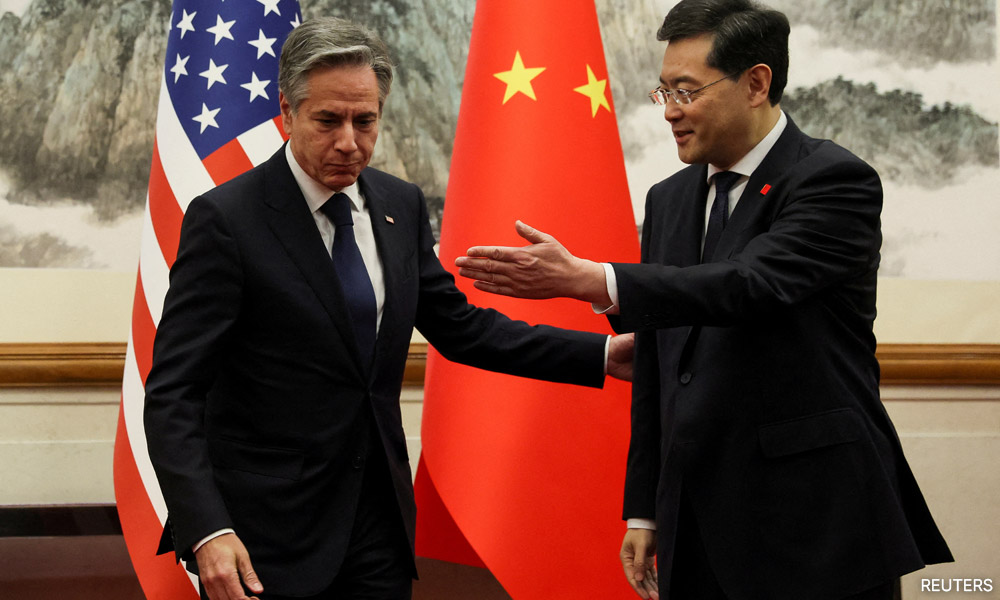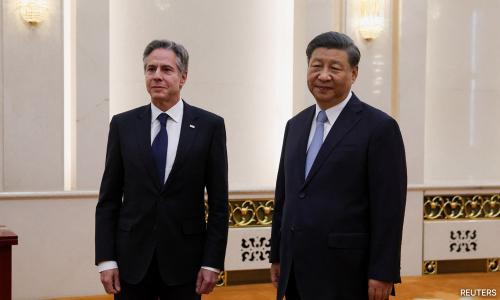Xi hails 'progress' as he meets Blinken during rare China trip
China's Xi Jinping hailed "progress" at the start of talks with US Secretary of State Antony Blinken in Beijing on Monday, the final engagement of a rare trip to ensure disputes between the superpowers do not spiral into conflict.
Blinken, the first holder of his post to meet the Chinese leader since 2018, had earlier strode towards Xi with his hand outstretched at the Great Hall of the People, positive signals in the choreography of diplomacy.
The two delegations then faced each other across a long conference table adorned with pink lotus flowers, with Xi at the head and Blinken just to his right.
The meeting, on the final day of Blinken's two-day visit, could help facilitate a summit between Xi and US President Joe Biden later in the year.
In November, Biden and Xi last met on the sidelines of the G20 summit in Bali, Indonesia, pledging more frequent communication. However, ties since then have deteriorated over issues ranging from Taiwan to espionage concerns.
"The two sides agreed to follow through with the common understandings President Biden and I had reached in Bali.
"The two sides have also made progress and reached an agreement on some specific issues. This is very good," Xi said at the start of the meeting in a video posted online by Chinese state television.
"I hope that through this visit, Mr Secretary, you will make more positive contributions to stabilising China-US relations," Xi added, addressing Blinken.
The talks lasted just over half an hour, according to the US State Department.
It was not immediately clear from Xi's remarks or previous readouts of Blinken's earlier discussions with China's top diplomat Wang Yi on Monday and foreign minister Qin Gang on Sunday exactly what progress had been made.
Blinken underscored the importance of open communication channels to manage their competition during more than three hours of talks with Wang, which the State Department called "productive."
Describing the US-China relationship as being at a low point, Wang said the root cause was the United States' wrong perception of China.
"We must take a responsible attitude toward the people, history and the world, and reverse the downward spiral of US-China relations," Wang said during the meeting with Blinken, according to a statement released by China's foreign ministry.
The lack of regular and open communication channels between the world's top two economies has sent jitters around the world. Beijing's reluctance to engage in regular military-to-military talks with Washington has alarmed China's neighbours.
During their seven and half hours of talks with Qin on Sunday, Blinken stressed "the need to reduce the risk of misperception and miscalculation", the State Department said.
Both sides emphasised the importance of making it easier for their citizens to visit and agreed on working to increase passenger flights, which boosted Chinese airline shares.
They also expressed a desire to stabilise bilateral ties despite what one US official called their "profound" differences and agreed that Qin would visit Washington to continue the conversation, though no date was set.
"This is going to be a process of sustained diplomacy," one senior (US) State Department official, speaking on the condition of anonymity, said on Sunday.
Blinken's February trip was postponed after a suspected Chinese spy balloon flew over US airspace, further deteriorating ties between the two largest global economies and its implications on financial markets, trade practices, routes, and supply chains.

Taiwan core issue
Beijing's tone on Taiwan, the democratic island it claims as its own, has been particularly pointed throughout Blinken's visit. Wang said, "China has no room for compromise or concessions", according to the Chinese readout.
The US has long stuck to a "strategic ambiguity" policy over whether it would respond militarily to an attack on Taiwan, which Beijing has refused to rule out.
When asked last year, Biden said Washington would defend Taiwan in the event of a Chinese invasion. However, aides later said his comments did not reflect a policy departure from the long-standing "one China" policy.
US officials have underscored that the United States does not support Taiwan's independence.
The Chinese readout of Sunday's meetings described them as constructive but made clear that Taiwan is the most crucial and potentially dangerous issue.
"Qin Gang pointed out that the Taiwan issue is the core of China's core interests, the most important issue in Sino-US relations, and the most prominent risk," Chinese state media quoted Qin as having told the top US diplomat.
US officials have been playing down the prospect of a significant breakthrough in talks.
Still, they and analysts expect Blinken's visit will pave the way for more bilateral meetings in the coming months, including possible trips by Treasury Secretary Janet Yellen and Commerce Secretary Gina Raimondo.
- Reuters
RM12.50 / month
- Unlimited access to award-winning journalism
- Comment and share your opinions on all our articles
- Gift interesting stories to your friends
- Tax deductable

